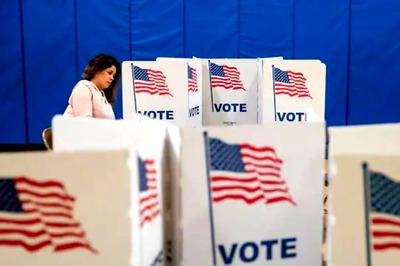
views
NEW YORK: Stocks were broadly lower and bond yields slipped on Friday on concern about dwindling stimulus in the United States and the economic cost of rising COVID-19 infections around the world.
Hopes of a stimulus-led recovery faded after U.S. Treasury Secretary Steven Mnuchin said key COVID-19 pandemic lending programs at the U.S. Federal Reserve to support businesses and local governments would expire by the end of 2020.
Stocks had edged higher in Europe earlier. Around 1600 GMT, the Dow Jones Industrial Average was down 123.46 points, or 0.42%, to 29,359.77 and the S&P 500 had lost 10.19 points, or 0.28%, to 3,571.68. The tech-heavy Nasdaq Composite had added 4.32 points, or 0.04%, to 11,909.04.
The benchmark 10-year Treasury yield was up 4/32 in price to yield 0.8439%, from 0.855% late on Thursday. The rate had slipped earlier to its lowest level in 10 days at 0.818%, before stabilizing in later trading.
The dollar index fell 0.004%, with the euro down 0.15% to $1.1855.
The Japanese yen weakened 0.07% versus the greenback at 103.79 per dollar, while Sterling was last trading at $1.328, up 0.14% on the day.
Mnuchin’s comments came after markets rose Thursday on hopes for further stimulus after U.S. Senate Democratic leader Chuck Schumer and Republican Majority Leader Mitch McConnell decided to resume COVID-19 relief talks.
FACTBOX-This is where the Fed’s emergency facilities stand.
Fresh flare-ups in coronavirus cases also hurt sentiment, with California announcing new curfews to try to fight surging infections, while Japan faces a third wave of the virus, and parts of Europe are already under recently renewed restrictions.
The World Trade Organization said that while global trade in goods had rebounded in the third quarter from lockdowns, there would be a slowdown at the end of 2020.
In a letter to U.S. Federal Reserve Chair Jerome Powell, Mnuchin said $455 billion allocated to Treasury under the CARES Act should be instead available for Congress to reallocate.
Although not used extensively, Fed officials felt the programs reassured financial markets and investors that credit would remain available to help businesses, local agencies and even non-profits through the pandemic.
Mnuchin’s decision added to market anxiety about broader economic growth as data shows the early fast recovery from a historic plunge in the U.S. economy is fading, with more than 10 million who had jobs in January still out of work.
“The fact the market is able to resist to this extent means there is some sun ahead, driven by the fact that in the medium term economic activity will accelerate and there is positive news on the vaccine,” François Savary, chief investment officer at Swiss wealth manager Prime Partners, said.
Disclaimer: This post has been auto-published from an agency feed without any modifications to the text and has not been reviewed by an editor
Read all the Latest News, Breaking News and Coronavirus News here

















Comments
0 comment